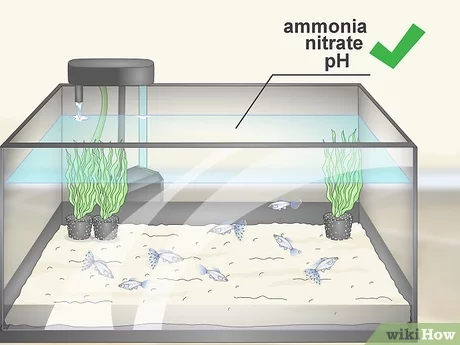Originally posted on May 10, 2023 @ 8:00 am
Last Updated on 7 months by admin
Keeping a freshwater aquarium is a rewarding experience, but it comes with a lot of responsibilities. One of the most important aspects of maintaining a healthy aquarium is regularly testing the water. Testing the water is crucial because it helps you detect any potential issues before they become a serious problem.
Your aquarium water is a complex ecosystem that requires specific conditions to thrive. Any slight changes in water parameters could harm your fish and other aquatic creatures. Therefore, testing the water regularly helps you maintain a healthy environment for your aquatic pets. In this article, we will discuss the importance of regularly testing your freshwater aquarium water and how it can make a significant difference in the long run.
Regularly testing your freshwater aquarium water is crucial for the health and well-being of your aquatic pets. Testing helps you monitor the levels of ammonia, nitrites, nitrates, and pH in the water. These levels can change quickly and unexpectedly, leading to stress and sickness in your fish. By testing your water frequently, you can catch any issues early and make necessary adjustments to keep your aquarium environment stable and healthy for your fish.

The Importance of Regularly Testing Your Freshwater Aquarium Water
As an aquarium owner, you are responsible for the health and well-being of your aquatic pets. One of the most crucial aspects of maintaining a healthy aquarium is ensuring that the water is clean and balanced. Regularly testing your freshwater aquarium water is essential to ensure that your fish, plants, and other aquatic creatures thrive.
The Benefits of Regular Aquarium Water Testing
Testing your aquarium water regularly can help you to:
1. Monitor Water Quality: Regular testing can help you to identify any changes in the quality of your aquarium water. This can help you to detect any potential problems before they become serious issues.
2. Maintain a Balanced Ecosystem: Testing your water helps you to maintain the proper pH balance, nitrate and ammonia levels, and other important factors that are critical to creating a healthy aquatic environment.
3. Prevent Fish Illness and Death: Unbalanced water conditions can lead to fish illness and death. Regular testing can help you to spot any imbalances or issues before they become fatal to your aquatic pets.
How often should you test your aquarium water?
The frequency of testing your aquarium water depends on several factors, including the size of your aquarium, the number of fish and plants you have, and the type of filtration system you use. A general rule of thumb is to test your water at least once a week. However, if your aquarium is heavily stocked or has a delicate ecosystem, you may need to test more frequently.
What should you test for?
There are several factors that you should test for when testing your freshwater aquarium water. These include:
1. pH Levels: The pH level of your aquarium water should be between 6.5 and 7.5. If the pH level is too high or too low, it can have adverse effects on your aquatic pets.
2. Ammonia Levels: Ammonia is produced by fish waste and decaying organic matter. High levels of ammonia can be toxic to your fish.
3. Nitrate Levels: Nitrate is a byproduct of the nitrogen cycle in your aquarium. High levels of nitrate can lead to algae growth and other issues.
4. Temperature: The temperature of your aquarium water should be appropriate for the species of fish and plants you have.
How to Test Your Freshwater Aquarium Water
Testing your freshwater aquarium water is a straightforward process. You will need to purchase a water testing kit that includes test strips or liquid reagents. Follow the instructions on the kit carefully to ensure accurate results. Record the results of each test in a logbook or spreadsheet so that you can track changes over time.
What to do if you discover imbalances in your aquarium water
If you discover imbalances in your aquarium water, there are several steps you can take to address the issue. These include:
1. Partial Water Changes: Regular partial water changes can help to dilute any imbalances or toxins in your aquarium water.
2. Adjusting pH Levels: If your pH levels are too high or too low, you may need to add a pH adjuster to your aquarium water.
3. Adding Beneficial Bacteria: Adding beneficial bacteria to your aquarium can help to break down waste and balance the ecosystem.
Conclusion
Regularly testing your freshwater aquarium water is essential to maintaining a healthy and balanced ecosystem for your aquatic pets. By monitoring water quality and taking action to address any imbalances or issues, you can ensure that your fish, plants, and other aquatic creatures thrive in their underwater home.
Frequently Asked Questions
Why is it important to regularly test your freshwater aquarium water?
Regularly testing your freshwater aquarium water is crucial for the health and well-being of your aquatic pets. The water in your aquarium may look clear but may contain harmful toxins and pollutants that can harm your fish, plants, and other aquatic creatures. By testing your water regularly, you can monitor the levels of ammonia, nitrites, nitrates, pH, and other parameters to ensure that they are within safe ranges. This will prevent any potential health issues and keep your aquarium healthy.
Testing your water regularly also allows you to identify any potential problems early on, such as bacterial or fungal infections, or imbalances in your aquarium’s nitrogen cycle. By catching these issues early, you can take appropriate action to address them before they become more severe. This can save you time, money, and most importantly, your aquatic pets.
What are the important water parameters that need to be tested?
There are several crucial water parameters that need to be tested regularly in a freshwater aquarium. These include ammonia, nitrites, nitrates, pH, and water hardness. Ammonia and nitrites are toxic to fish and can cause stress, illness, and even death if their levels are too high. Nitrates, while less toxic, can still cause health issues in fish if their levels are too high.
pH levels are also important to monitor, as fluctuations can stress your fish and disrupt the growth of plants in your aquarium. Water hardness, measured in degrees of hardness (dH), is a measure of the amount of dissolved minerals in your water and can affect the health of your fish and plants.
How often should you test your freshwater aquarium water?
The frequency of testing your freshwater aquarium water depends on several factors, including the size of your aquarium, the number and types of fish you have, and the filtration system you use. As a general rule, it is recommended to test your water at least once a week. If you have a heavily stocked aquarium or are introducing new fish or plants, you may need to test more frequently.
It is also important to test your water after any significant changes, such as a water change or adding new decorations. This will ensure that any changes do not negatively affect your aquarium’s water parameters.
What are the different methods of testing freshwater aquarium water?
There are several different methods of testing freshwater aquarium water, including test strips, liquid test kits, and electronic testers. Test strips are the easiest and quickest method, but they are not always the most accurate. Liquid test kits are more accurate but require more time and effort to use. Electronic testers are the most accurate and convenient but are also the most expensive.
Regardless of the method you choose, make sure to follow the instructions carefully and keep your testing equipment clean and well-maintained. This will ensure that your results are accurate and reliable.
What should you do if your water parameters are out of range?
If your water parameters are out of range, it is important to take action to correct the issue. This may involve performing a water change, adjusting your filtration system, adding or removing fish or plants, or adjusting the pH or water hardness of your aquarium. Make sure to research the appropriate steps to take depending on the specific parameter that is out of range.
It is also important to avoid overcorrecting the issue, as sudden changes can cause stress and harm to your aquatic pets. Take gradual steps to correct any issues and continue to monitor your water parameters regularly to ensure that they remain within safe ranges.

Aquarium Water Testing 101: How Often Should You Test Your Water?
In conclusion, regularly testing your freshwater aquarium water is crucial for the health and wellbeing of your aquatic pets. By monitoring the levels of ammonia, nitrite, nitrate, pH, and other important parameters, you can ensure that your fish, plants, and invertebrates are living in a safe and stable environment.
Not only does testing prevent health issues and disease outbreaks, but it also helps you identify problems early on. This means you can take corrective action before the situation becomes critical or irreversible. Whether you use test strips or liquid test kits, make sure to follow the instructions carefully and keep a log of your results.
Remember that maintaining good water quality is a continuous process, not a one-time event. Even if your water looks clear and odorless, there may still be hidden issues that can harm your aquatic ecosystem. Therefore, make it a habit to test your freshwater aquarium water on a regular basis, preferably once a week or more often if needed. With a little effort and diligence, you can enjoy a thriving and beautiful aquatic world in your home or office.
